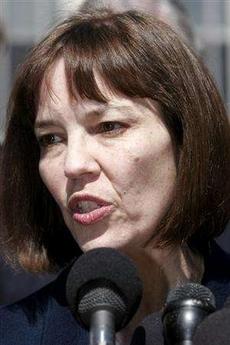Concern pervades New York Times newsroom over Judith Miller

John Byrne
There’s a feeling of unease at the Times.
Veteran New York Times reporter Judith Miller’s one-woman crusade to protect her White House source in a CIA leak inquiry has stirred passions among Times staffers not seen since the Jayson Blair scandal, when the unsuspecting paper ran dozens of fictionalized articles.
Conversations with nearly a dozen Times reporters revealed a scarred landscape of discontent. Few reporters were willing to go on the record, but none who spoke with RAW STORY said they supported Miller. Many voiced worries that the paper’s editor, Bill Keller, was sacrificing his own integrity to protect her.
“I think they’re looking at him in wonderment, and hoping he can figure a way out of this,” one veteran reporter said. "Because he's in a real bind."
“Part of the fear is that there’s a sense that he might not know very much, but he’s been forced by circumstance, and possibly by the publisher, to become a cheerleader rather than the newsman.”
“I think that pains him greatly,” the reporter added. “He is a news guy, he’s one of the best, and to be in a circumstance where he’s trapped, and he’s carrying somebody else’s water, and he can’t let the newspaper do what it does best--which is run with a story--has to be agonizing for him.”
Miller, who joined the Times Washington bureau in 1977, spent 85 days in jail after refusing to reveal who told her the name of covert CIA officer Valerie Plame Wilson. Since her release, reporters say, she has not been cooperative with the paper’s investigation into her role in events surrounding the case. Two reporters allege there have been newsroom outbursts between Keller and Miller over her refusal to talk to the paper’s own reporters.
Others closer to the paper’s planned leak story declined to go on record about the subject. Some are hedging their bets on the Times’ hyped self-examination.
“It’s been impossible to report on it,” one staffer said.
Several reporters said they didn’t feel comfortable talking, given their distance from the story.
Miller was seen as a key asset to the Times in the last few years as the paper’s terrorism “expert,” keeping the New York heavyweight ahead of the Washington Post. Keller, while acknowledging Miller’s weaknesses, has defended Miller in the past.
“She has sharp elbows,” Keller wrote in an email to New York Magazine in 2004. “She is possessive of her sources, and passionate about her stories, and a little obsessive. If you interview people who have worked with Sy Hersh, I’ll bet you’ll find some of the same complaints.”
Among Miller's other supporters at the top is Times managing editor Jill Abramson.
“Judy Miller is a tireless and absolutely relentless reporter,” Abramson told New York Magazine. “In the Washington bureau, she was often the last reporter still working, sometimes making phone calls until the wee morning hours.”
While few are talking to the outside, the newsroom is abuzz with gossip surrounding the case.
At least two reporters say they’ve heard that Miller plans to resign after the paper runs their examination, which most expect Sunday. According to the Huffington Post, Miller has inked a $1.2 million deal for a tell-all expose.
Times spokeswoman Catherine Mathis would not comment on whether Miller planned to resign. Nor did she answer questions about whether Miller would author an expose on her involvement in the Plame affair once the paper publishes its full account of Miller's role in the matter.
Miller could not be reached for comment.
Miller’s reporting has also generated alarm among Times staffers and the Washington press corps. In particular, reporters have questioned a piece she wrote on Iraq’s acquisition of aluminum tubes, which her article asserted could be used for the development of nuclear weapons. This turned out to be false.
Her sources have also raised eyebrows -- Iraq expatriate and current Iraq oil minister Ahmed Chalabi among them. Some believe Chalabi snookered the U.S. into attacking Iraq with bogus tales of weapons of mass destruction. Miller is also believed to have relied on controversial UN ambassador John Bolton, who visited her while in prison.
Due in part to Miller’s reporting, the Times was forced to issue a public apology for their sensationalized WMD reporting in 2004. The Times chose not to mention Miller by name, saying, “Some critics of our coverage during that time have focused blame on individual reporters. Our examination, however, indicates that the problem was more complicated.”
But one thing is certain: Miller’s public trial has left a sour taste in reporters' mouths.
“Everybody’s been puzzled the entire time,” one reporter remarked. “I think the longer she goes without writing something, without telling what she told the grand jury, without explaining what this whole thing has been about, the worse it gets.”
The Times public editor agrees.
"The lifting of the contempt order against Judith Miller of The New York Times in connection with the Valerie Wilson leak investigation leaves no reason for the paper to avoid providing a full explanation of the situation," he wrote in a column Thursday. "Now."
Link Here




0 Comments:
Post a Comment
<< Home